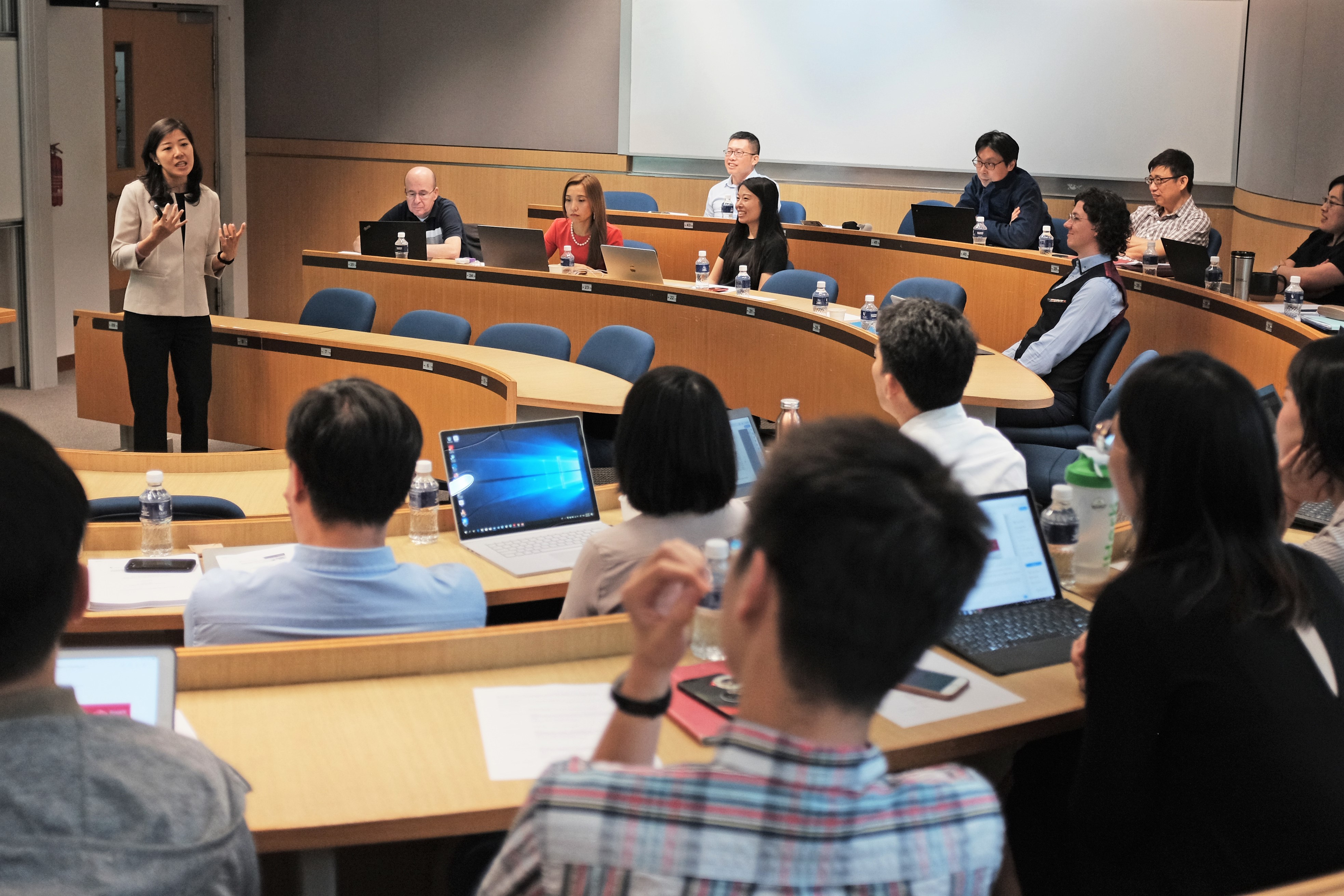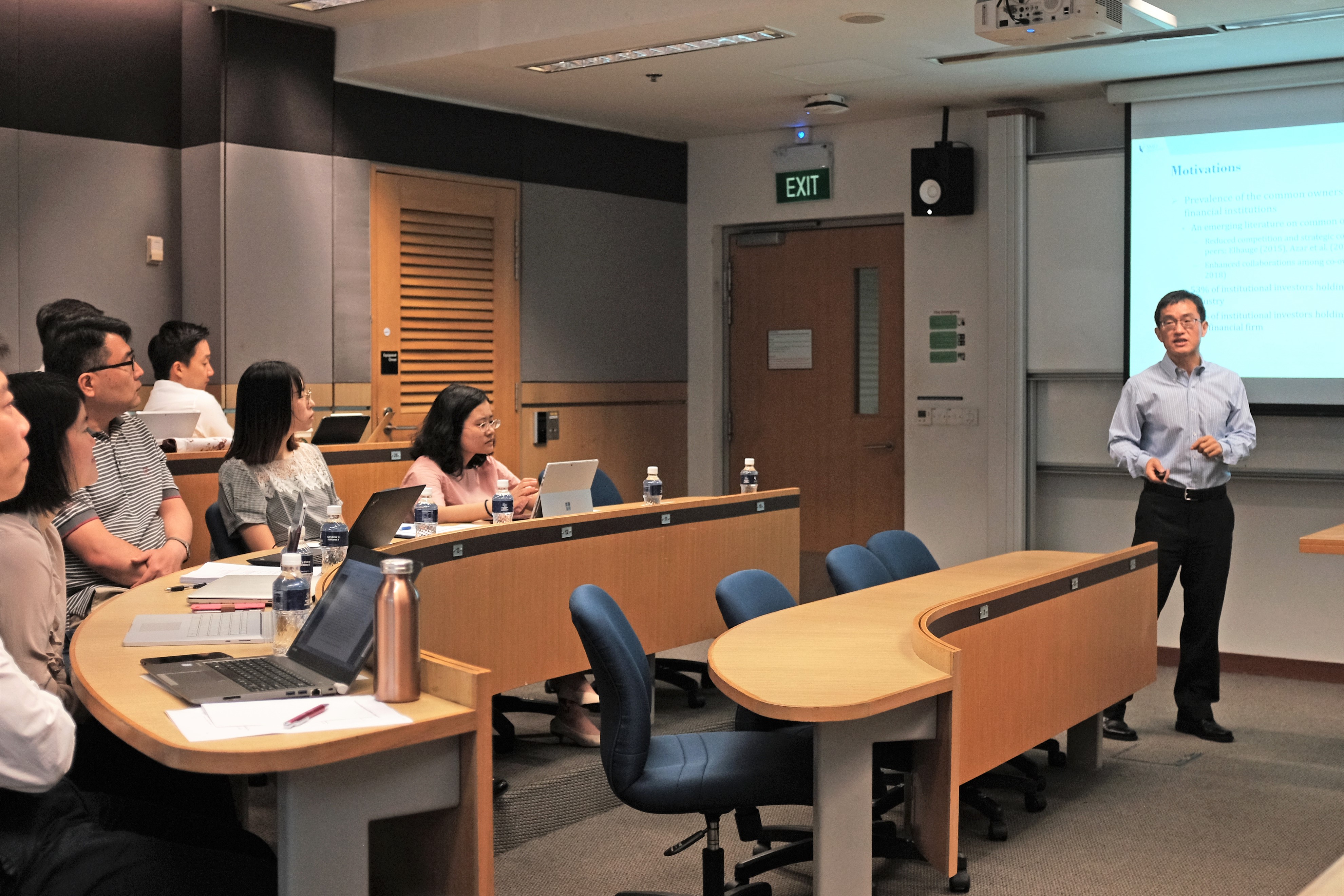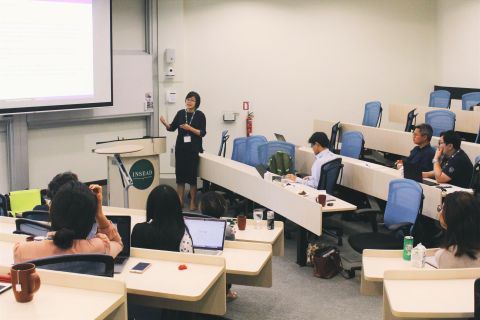
Above: SMU Associate Professor Holly Yang sharing her research findings at the Singapore Management University (SMU) School of Accounting Research (SOAR) Accounting Research Summer Camp 2019.
By Rebecca Tan
SMU Office of Research & Tech Transfer – The average customer trying to decide between flying on American Airlines or JetBlue might not realise this, but both companies are partially owned by the same institutional investors. In fact, the top three asset management companies in the US – Vanguard, BlackRock and State Street – collectively own between 14-20 percent of every major airline in the country.
What is the impact of this cross-ownership on consumers? In a hotly debated paper recently published in the Journal of Finance, Professors José Azar, Martin Schmalz and Isabel Tecu suggest that cross-ownership reduces incentives for airlines to compete with each other, since higher prices or lower costs across the industry would mean greater profits for shareholders. In other words, cross-ownership can be anti-competitive.
However, there might be certain situations in which cross-ownership is beneficial, according to the findings of two research papers presented at the Singapore Management University (SMU) School of Accounting Research (SOAR) Accounting Research Summer Camp 2019.
Learning about the industry from investors
One way that cross-ownership could be beneficial is that it improves the quality of information that institutional investors have, said SMU Associate Professor Holly Yang. By investing in multiple companies in the same industry, institutional investors accumulate industry-level information – such as demand from product markets or strategic issues about competitors – that individual firm managers do not have. “As a result, they are likely to have a better understanding of industry trends and the overall competing landscape,” she explained.
This private information is also reflected in stock prices and investors’ trading decisions. Managers can study these stock prices and gain insights into the industry as a whole to make better investment decisions for their firms. For example, consider SoftBank’s Vision Fund, which is not only a big backer of Uber but is also heavily invested in Nuro, an autonomous vehicle startup. By investing in Nuro and hypothetically pushing its price up, SoftBank indirectly sends a signal to Uber’s managers about whether or not they should continue to invest in developing driverless cars.
To test their hypothesis that cross-ownership can help managers of individual firms to learn about the industry and make more informed investment decisions, Professor Yang and her collaborator SMU Associate Professor Cho Young Jun looked at whether the degree of institutional ownership was correlated to a firm’s sensitivity of investment to stock prices as a measure of managerial learning.
As expected, they found that firms invest more efficiently as the level of cross-ownership in peer firms in the same industry increases. However, it could be possible that the higher levels of monitoring that come with being owned by the institutional investor is what drives the firms improved investment efficiency, rather than industry knowledge. To rule out this possibility, Yang investigated the effect of cross-ownership on non-peer firms as well and showed that the relationship between cross-ownership and investment efficiency was reversed.
“In some sense, this suggests that institutional investors are actually sacrificing their portfolio firms when they do not hold industry peers. In other words, the firm is hurt when its institutional investors have cross-ownership in non-peer industries,” Professor Yang explained.
“Too much of the recent debate on cross-ownership is centred on institutional blockholders who likely have other incentives such as shareholder engagement. We take a step back to reconsider one of the fundamental roles of institutional investors, which is to improve price discovery and increase allocative efficiency.”
A double-edged sword

Above: Professor Cheng Qiang, Dean of the SMU School of Accountancy, presenting his paper on cross-ownership at the Singapore Management University (SMU) School of Accounting Research (SOAR) Accounting Research Summer Camp 2019.
In addition to improving managerial learning, cross-ownership could also improve the accuracy of analyst forecasts. However, this depends critically on the strength of the institutions where the companies are domiciled, said Professor Cheng Qiang, Dean of the SMU School of Accountancy.
His paper focused on common owners of brokerage houses and the firms followed by these brokerage houses. The concern in such situations is that analysts will face a conflict of interest, Professor Cheng explained. By virtue of having a common owner, analysts have both the incentive and ability to issue overly optimistic forecasts on the co-owned firms. The common owners might exploit their ownership – through communications with management, shareholder activism or the threat of exit – to pressure analysts into issuing favourable forecasts. Yet, on the other hand, cross-ownership could facilitate the flow of information between the brokerage house and the covered co-owned firms, thereby improving the quality of analyst forecasts issued.
What Professor Cheng found was that cross-ownership was associated with poorer analyst forecast accuracy in China, suggesting that the conflict-of-interest effect dominates. But in the US, which has stronger legal institutions and where analysts seek to protect their reputations, the opposite effect was observed. In the US case, cross-ownership led to better-quality information and more accurate analyst forecasts.
These results prevailed even under conditions of “exogenous shock”, such as when China imposed a new regulation in 2008 stating that no institution can have ownership in more than two brokerage houses or be the largest owner of more than one. This resulted in institutional investors disposing their shares of brokerage houses, leading to an unexpected termination of the existing common-ownership relationship.
“Consistent with our expectation, we find that the termination of common ownership leads to reduced analyst forecast bias,” Professor Cheng said. “Likewise, when the merger of financial institutions results in a formation of common ownership in the US setting, connected analysts’ forecast accuracy improves, due to the informational effect of newly established common ownership.”
Calling common ownership a “double-edged sword”, Professor Cheng said that their findings highlight ownership-induced conflicts of interests that can distort analyst forecasts and reduce the quality of information environment in capital markets in weak institutions such as China. “We hope to draw information users’ attention to this issue when they use analyst reports in their decision making,” he said.
Back to Research@SMU Aug 2019 Issue
See More News
Want to see more of SMU Research?
Sign up for Research@SMU e-newslettter to know more about our research and research-related events!
If you would like to remove yourself from all our mailing list, please visit https://eservices.smu.edu.sg/internet/DNC/Default.aspx

